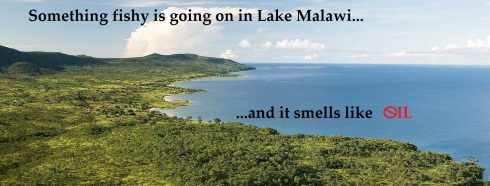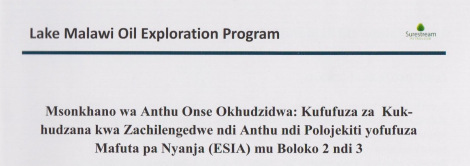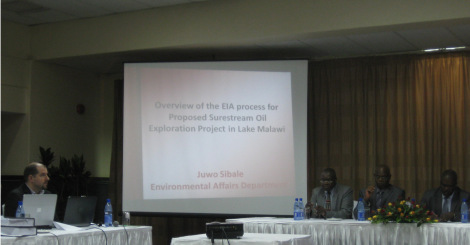If the remark by General Manager of Surestream Petroleum Keith Robinson qouted as saying ‘we are intending to discover oil deposits [in lake Malawi]’ is anything to go by- sounding somewhat ‘done deal’ then there is a big reason to be worried. Someone, somewhere has already rubber stamped the ESIA. So the past month, well January, the Environmental Affairs Department of Malawi had been organising ‘public hearings’ to share the findings of the Environmental and Social Impact Assessment (ESIA) on the proposed oil exploration on Lake Malawi by Surestream Petroleum. As a defender of the poor lake and an interested citizen, I put my job aside (sshhhh!, I hope my boss is not reading this after all it was just for an hour and then I got a free meal at the end) and went to attend one of the public hearings in Lilongwe. Below is what a friend of mine wrote about the hearings (we met for the first time at the hearings after being friends virtually online- I follow her blog ‘Mining In Malawi‘ and she follows yours truly Envirogentia.
*****Mining In Malawi compiled this report*****
At each of the public hearings, the Environmental Affairs Department ( through one Juwo Sibande) has presented on the purpose of public hearings within the Environmental Impact Assessment process as defined within Malawi’s 1996 Environment Management Act. Following Sibande’s presentation, the RPS Group has provided an overview of the ESIA (led by head of the ESIA team Stuart Sharp), which is helpful as the ESIA is close to 500 pages. Following the presentations, the participants have had an opportunity to address questions to the government, ESIA consultants and Surestream Petroleum. Keith Robinson, General Manager of Surestream Petroleum, has been present at each of the public hearings.
Public hearings on environmental (social) impact assessments are a legal requirement stipulated in Malawi’s Environment Management Act (EMA) (1996). The ESIA was submitted by RPS Group in December 2012. The ESIA is being reviewed by the Technical Committee on the Environment (Section 16, EMA) and the ongoing public hearings will contribute to this review process.
According to the Director of the Environmental Affairs Department Aloysius Kamperewera, public hearings help the Government of Malawi to “gather more information, more ideas on the proposed project and how it might impact on people and the environment”. Following these consultations, the amended ESIA will be submitted to the National Council on the Environment (Section 10, EMA), which is responsible for making a final recommendation to the Minister.
Drilling Lake Malawi for oil will take a long time, possibly between 15 and 30 years (see the handouts below). At each of the public hearings, the Government of Malawi, the RPS Group and Surestream Petroleum have emphasised that there is “no drilling at this stage”. The Environmental and Social Impact Assessment (ESIA), which is available online, refers only to the initial stage in oil exploration – the aeromagnetic survey, the full tensor gravity survey and 2D seismic survey, which may also lead to a lake bottom survey.
Once (or if) this ESIA has been approved, Surestream Petroleum will be allowed to proceed with the aforementioned surveying activities. If the results of the survey are promising, Surestream Petroleum would require another ESIA for exploratory oil drilling. To produce oil after successful results from the surveying and exploratory drilling, a company would need to apply for and be awarded a production licence (as outlined in Malawi’s Petroleum (Exploration and Production) Act (1983)) and require another ESIA before being given the green light.
The public hearings
At public hearings in Karonga and Rumphi, participants asked the government to put in place appropriate petroleum legislation so that Malawians benefit. The Nation reported that Bishop Matthew Mtumbuka of the Karonga Catholic Diocese asserted
“We cannot keep on pretending that things are well in Malawi. Our people are poor and suffering. We need these resources to ensure that we uplift lives of Malawians, but we need to do this in the confines of the law.”
In Mzuzu on Wednesday 22 January 2014, the Catholic Commission for Justice and Peace (CCJP) and the Church of the Central African Presbyterian (CCAP) Livingstonia Synod warned the government about awarding licences under outdated laws; the Petroleum Exploration and Production Act came into effect in 1983. Ministry of Mining’s Peter Chilumanga responded that the country should not turn away investors even if the laws need revision. He pointed out that the first step is to address this situation is by developing a Petroleum Exploration and Production Policy to guide amendments to the 1983 Act.
In addition, Capital FM reported on 22 January 2014 that Paramount Chief Kyungu of Karonga spoke out against extraction of oil from Lake Malawi.
Kyungu told a public hearing organized by the Surestream Petroleum Malawi that the development is unwelcome in the district.
According to the paramount chief, there may be few qualified marine experts in Malawi to conduct the oil drilling activity without causing harm to both people and other living things such as fish.
He cited the oil spillage that occurred in the United States a few years ago, saying such a country with a big economy took some time to rectify the problem.
He says if the same development happens to Malawi it would be disaster.
During the public hearing held in Lilongwe (28 January 2014, see photos here), discussion focussed on compensation of people (particularly those relying on fishing) who would be affected by the surveying activities, the absence of many civil society organisations at this public hearing in Lilongwe, and the displacement of fish as a result of surveying. To date, research on the impact of proposed surveying methods has not been conducted in a fresh water environment.
Three members of the general public pressed the government about the ongoing dispute with Tanzania over the lake boundaries.
“The issue of the border should be something that should be treated with more depth. There was a very detailed presentation of the villagers’ livelihoods on the Malawi side but there was silence on the Tanzania side.”
The government highlighted that the public hearing was not the appropriate place to discuss the border dispute since the hearings are organised by the Environmental Affairs Department, which does not take a “political angle”. Nonetheless, it is clear that the outcome of the dispute will have implications for which country manages the Lake and its resources. Another participant exclaimed
“We [Malawians] are the owners and we are not supposed to be given a portion but they are supposed to get a portion from us.”
Surestream Petroleum General Manager Keith Robinson described the company’s social contributions to date.
“Surestream Petroleum started their involvement in Malawi two years ago. As you can see, we are still at a very early stage in the whole process which can take very many years. We are going through the process of getting to the point where we get all the permissions in line, all the considerations in line, and all the correct approvals and considerations and at some point we will begin activiteis on the lake. We have not waited to that point to start our contributions.
Our single largest project has been the Surestream Football Academy. We have identified talent, and even us in our wildest expectations could not have imagined what we have seen.
What those activities are will depend on consultations, depend on direction from governmental sources, DCs [District Commissioners], civil society. This is a long, long process. We have shown commitment from the start and we will continue to do so in all our social activities.”
Some Malawian citizens may not be as convinced. Last week, www.lakegate.com was launched by a group of “concerned Malawians” who have been recruiting people to sign up to two petitions (here and here) to stop oil drilling in Lake Malawi.
Peter Chimulanga, Deputy Director of Mines, addressed such concerned citizens directly,
“Government is in the process of developing how we should manage the resources so that there is mutual benefit from the investors’ point of view and government. We are in the process of developing a Petroleum and Exploration Management Policy. Within whose confines the licence has been awarded to Surestream. We will go on to revise the Act. […]
We will ensure we will adopt the best practices used worldwide, so that nobody should be complaining that “we did not benefit” neither should the investor complain. There is a difference between solid and liquid minerals. E.g. we are now looking at the process of exploring, there is investment going in, when we come to the next stage, assuming that in place x there is potential for oil exploration, the company will conduct a drilling exploratory process. That alone is quite expensive (over 800 million USD) just to sink one exploration drilling well. We are talking of quite substantial investment from an investor. Then we need to understand how we can best share in light of the investment that has been done by the investor and in light of the fact that the resource belongs to Malawi. […]
It’s a balancing act that we are trying to follow by using the best approach, the best practice world wide. We should be bearing that in mind when we are talking about sharing [resources]. So that there is no complaint from the investor or the common man who lives in Chilumba.”
The public hearings were brought to a close on Wednesday 29 January 2014 in Blantyre with Robinson’s remarks that “we are intending to discover oil deposits”.
****End of Mining In Malawi’s Article***
Wow, that final remark by Robinson “we are intending to discover oil deposits”, seem somewhat ‘Done Deal’. Cry, my beloved lake, weep!







Leave a comment